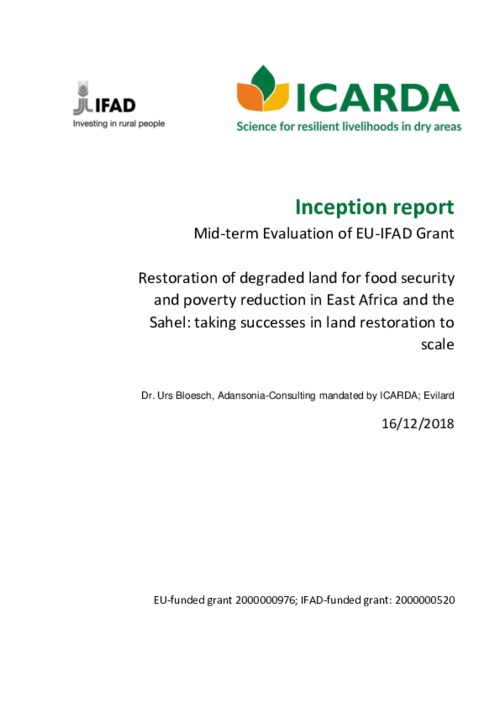International Non-Governmental Organizations have popularized payment for ecosystem services (PES) because of their potential to simultaneously achieve rural development and ecological conservation goals (GEF Secretariat 2014). Despite their rapid diffusion, there is insufficient assessment of…
This study aims to explain effects of soil textural class, topography, land use, and land use history on soil greenhouse gas (GHG) fluxes in the Lake Victoria region. We measured GHG fluxes from intact soil cores collected in Rakai, Uganda, an area characterized by low‐input smallholder (<…
Agriculture is a major contributor to climate change,
emitting the three major greenhouse gases (GHGs) –
carbon dioxide (CO2), methane and nitrous oxide – into the
atmosphere. According to the Fifth Assessment Report of
the Intergovernmental Panel on Climate Change (IPCC…
This report is the results of the mid-term review for the EU-IFAD project "Restoration of degraded land for food security and poverty reduction in East Africa and the Sahel: taking successes in land restoration to scale" Project.
This draft model contract was developed on the basis of the drafts “Proclamation to Provide for Agricultural Production and Marketing Contracts in Ethiopia” later modified and renamed as “Proclamation to Provide for the Establishment of the Central and Regional Contract Farming Coordinating…
This draft model lease contract considers international best practices and recommendations, regarding the design of contract for farmland investments. In particular, the IISD Guide to Negotiating Investment Contract for Farmland and Water, were used as a reference while designing this current…
Different government institutions in Ethiopia are working on land related issues to tackle and manage data and information independently from each other, even though their activities and mandates are often related or even overlap. Those institutions do not have a shared modern information…
The Ethiopian Growth and Transformation Plan (GTP), targets achieving food security and becoming a middle-income country by 2025. One part of the strategy is encouraging large-scale agricultural investment (LSAI) by domestic and international investor. To that effect, ample arable land in…
To address food insecurity in the country, the Government of Ethiopia envisages a rapid transformation in the agriculture sector to increase production, productivity, markets and employment. It has, therefore, strategically promoted land investments for agricultural development as part of the…
Between 2005 and 2016, the Ethiopian Government leased about 2.4 million hectares of land for commercial agricultural investments to private domestic and foreign investors as a means of economic growth, food security and job creation. In order to steer these vast amounts of large-scale…


